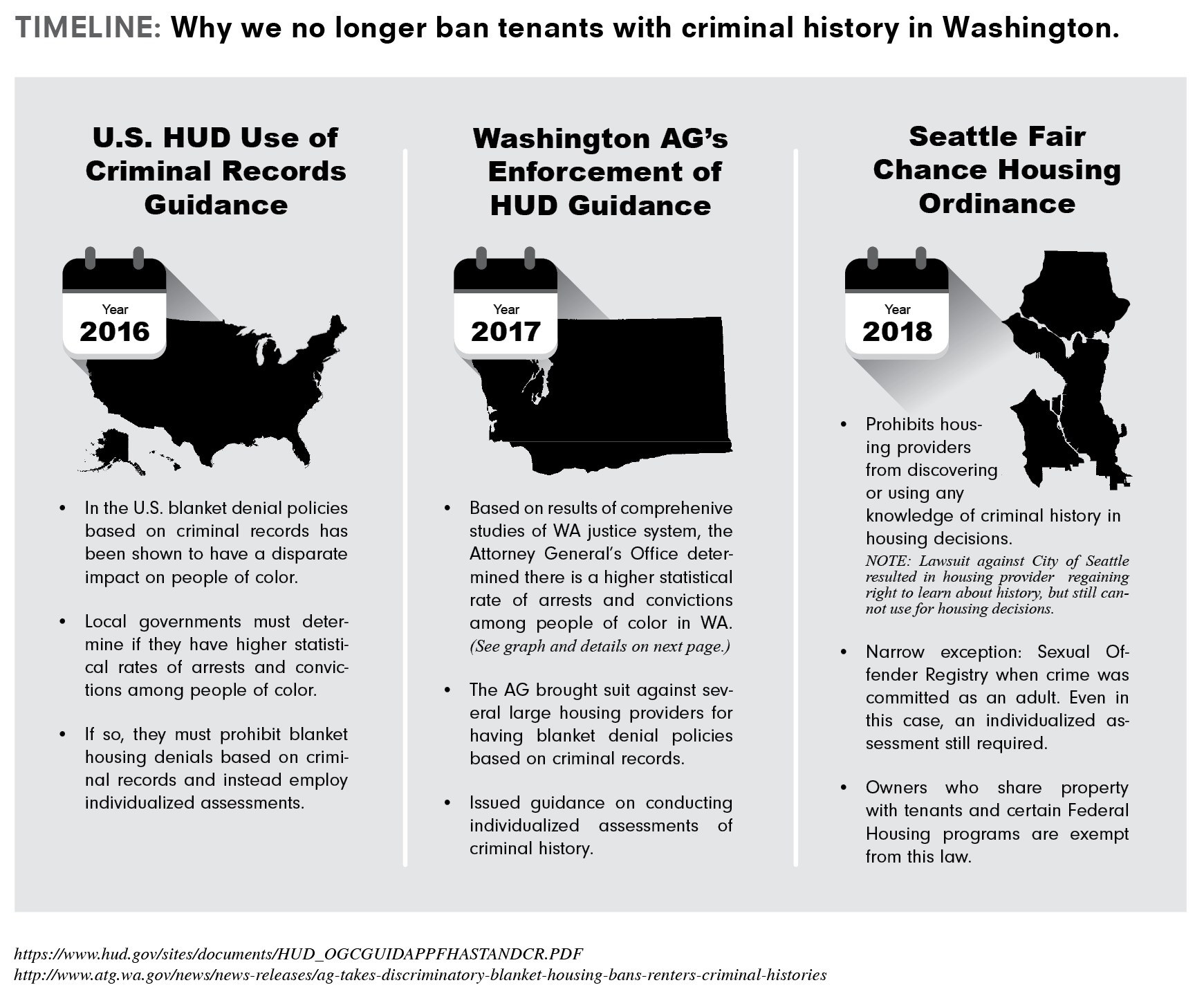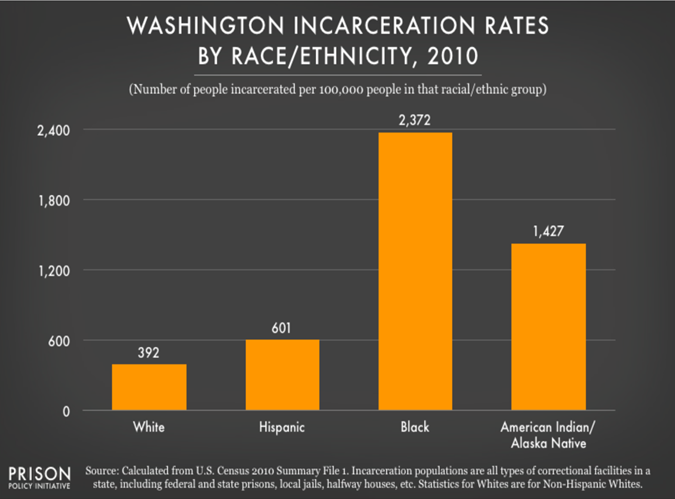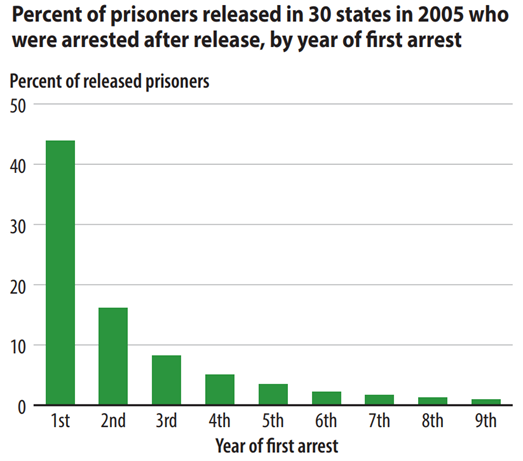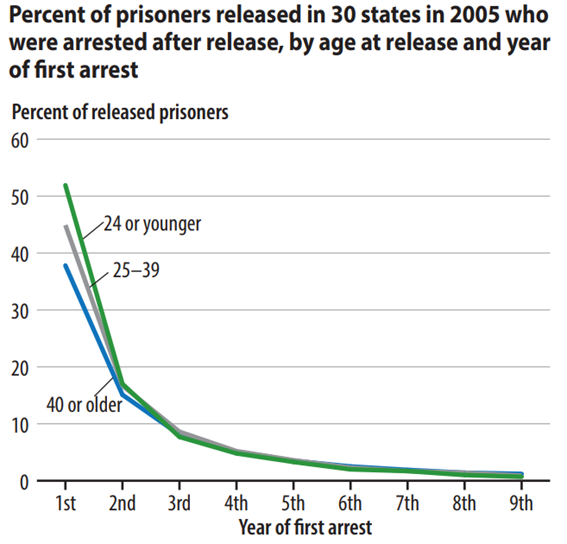Assessing Criminal Records in Tenant Screening
Many housing providers in Washington are unaware of the statewide ban on any blanket housing denials based on a tenant’s criminal history. For example, this means you are prohibited from specifying automatic denial for a conviction of arson or murder. No matter what type of criminal record is uncovered, you are required to an “individualized assessment” of facts such as the type and severity of the offense, and how long ago the offense occurred, in order to determine if the person poses significant risk and that you have a business need to deny tenancy. The City of Seattle takes this a step further and does not even allow you to consider criminal records in your decision to deny housing.

Washington State’s Analysis of Disparate Impact
• Minority drivers are more likely to be searched by the Washington State Patrol than white motorists, although the rate at which searches result in seizures is highest for whites.
• Disparate treatment exists in the context of pretrial release decisions, which systematically disfavors minority defendants.  • Youth of color in the juvenile justice system face harsher sentencing outcomes than similarly situated white youth, as well as disparate treatment by probation officers.
• Youth of color in the juvenile justice system face harsher sentencing outcomes than similarly situated white youth, as well as disparate treatment by probation officers.
• Defendants of color were significantly less likely than similarly situated white defendants to receive sentences that fell below the standard range.
• Among felony drug offenders, black defendants were 62% more likely to be sentenced to prison than similarly situated white defendants.
Source: Preliminary Report on Race and Washington’s Criminal Justice System by the Research Working Group of the Task Force on Race and the Criminal Justice System (2011)
What to Include in Your Criteria Notice
Your application criteria notice is a critical policy document you must create for your rental property. You may need multiple versions based on the location and features of your properties. See RHAWA’s form, Application Criteria Guidelines which includes the following example statements for how you will evaluate criminal records as part of your screening process.
Seattle
• We perform an individualized assessment of any adult on a county, state, or national sex offender registry to determine whether a business reason exists to deny tenancy.
• We consider …
the nature and severity of the offense, the number and type of convictions, the time that has elapsed since the conviction, your age at the time of conviction, evidence of good tenant history before and after conviction, any additional information showing rehabilitation, good conduct, or other factors that the individual would like us to consider.
WA State (Outside Seattle)
• We perform an individualized assessment of any adult with criminal convictions in the last __ years to determine whether a business reason exists to deny tenancy.
• We consider …
the nature and severity of the offense, the number and type of convictions, the time that has elapsed since the conviction, your age at the time of conviction, evidence of good tenant history before and after conviction, any additional information showing rehabilitation, good conduct, or other factors.
When a Screening Report Includes Criminal Records

It’s a best practice to evaluate all other criteria before conducting an assessment of any criminal records. Only evaluate criminal records for those who pass all other criteria. Consider each of the following when determining if the prospective poses an actual risk to other people on your property or to your business.
1. Time elapsed since conviction
• The vast majority of U.S. Counties limit public record reports to seven years (including WA).
• Those with no convictions in past 5 years are no more likely to commit felon than general population.
Source: Bureau of Justice Statistics, Recidivism of State Prisoners Released in 2005 data collection, 2005–2014.
2. The nature and severity of crimes
• Always look into the underlying facts such as the in the following examples:
• Obstructing a law enforcement officer (Running away from a police officer who is pointing a Taser at them.)
• Manufacturing, sale, delivery or possession of controlled substance (Possession of less than ½ gram of cocaine.)
• Assault (Victim of domestic violence convicted of assaulting her abuser.)
• Seattle: Only look at sex offender registry information.
3. Number and type of convictions
• A pattern of criminal behavior is more predictive of future criminal behavior.
• A single offense followed by a few years of good behavior is more predictive of good behavior.
4. Age at time of conviction
• There is more risk of repeat offending for younger adults within first few years of release.
• Seattle: You are not permitted to consider crimes unless committed as an adult.
5. Evidence of good tenant history before and after conviction
• Try to get references from at least two previous landlords for all applicants.
6. Evidence of good conduct, rehabilitation and other factors
• Get a written or oral statement from:
o The prospective occupant or the tenant.
o A current or previous employer.
o A current or previous landlord.
o A member of the judiciary or law enforcement, parole or probation officer, or person who provides similar services.
o A member of the clergy, counselor, therapist, social worker, community or volunteer organization, or person or institution who provides similar services.

• Obtain copies of the following:
o Certificate of rehabilitation.
o Certificate of completion or enrollment in an educational or vocational training program, including apprenticeship programs.
o Certificate of completion or enrollment in a drug/alcohol treatment program or rehabilitation program.
• Seattle: Only consider what the person chooses to share.
Source: Bureau of Justice Statistics, Recidivism of State Prisoners Released in 2005 data collection, 2005–2014.
What if I choose to deny the tenancy?
• Complete and send adverse action notice to applicant.
• Document decision-making process in your files.
o Factors that led you to believe there were risks, type of crime, frequency, time elapsed, age, etc.
o What is your “business need” to deny tenancy.
Don’t miss our Assessing Criminal Records in Screening Zoom class with
instructor, Christopher Cutting on June 20!
Formal legal advice and review is recommended prior to selection and use of this information. RHAWA does not represent your selection or execution of this information as appropriate for your specific circumstance. The material contained and represented herein, although obtained from reliable sources, is not considered legal advice or to be used as a substitution for legal counsel.

